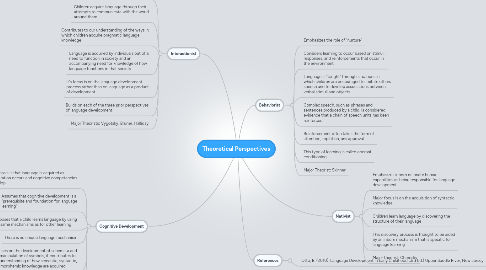Theoretical Perspectives
저자: Kylie Lucas

1. Interactionist
1.1. Focuses on the primary role of sociocultural interaction in children's development of language knowledge
1.2. Children acquire language through their attempts to communicate with the world around them
1.3. Contributes to our understanding of the ways in which children acquire pragmatic language knowledge
1.4. Language is acquired by individuals out of a need to function in society and an accompanying need for knowledge of how language functions in that society
1.5. It's focus is on the language development process rather than on language as a product of development
1.6. Builds on each of the three prior perspectives of language development
1.7. Major Theorists: Vygotsky, Bruner, Halliday
2. Cognitive Development
2.1. Emphasis is that language is acquired as maturation occurs and cognitive competencies develop
2.2. Assumes that cognitive development is a "prerequisite and foundation for language learning"
2.3. Proposes that a child learns language by using the same mechanisms as for other learning
2.4. There is no unique language mechanism
2.5. Focuses on the development of schemata and the manipulation of symbols, it contributes to our understanding of how semantic, syntactic, and morphemic knowledge are acquired
2.6. Major Theorist: Piaget
3. Behaviorist
3.1. Emphasizes the role of "nurture"
3.2. Considers learning to occur based on stimuli, responses, and reinforcements that occur in the environment
3.3. Language is "taught" through situations in which children are encouraged to imitate others speech and to develop associations between verbal stimuli and objects
3.4. Complex speech, such as phrases and sentences produced by a child, is considered evidence that a chain of speech units has been reinforced
3.5. Reinforcement often takes the form of attention, repitition, ans approval
3.6. This type of learning is called operant conditioning
3.7. Major Theorist: Skinner
4. Nativist
4.1. Emphasizes inborn or innate human capabilities as being responsible for language development
4.2. Major focus is on the acquisition of syntactic knowledge
4.3. Children learn language by discovering the structure of their language
4.4. This discovery process is thought to be aided by an inborn mechanism that is specific for language learning
4.5. Major theorist: Chomsky
5. References
5.1. Otto, B. (2010). Language Development in Early Childhood (3rd Ed.) Upper Saddle River, New Jersey: Merrill.


